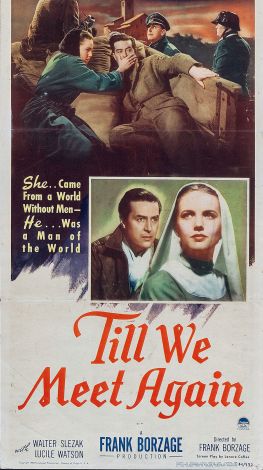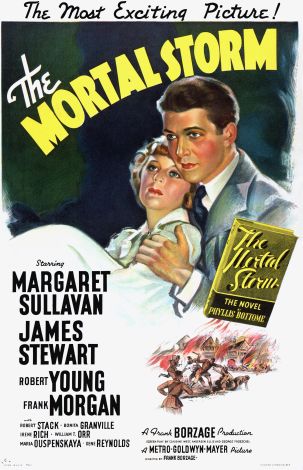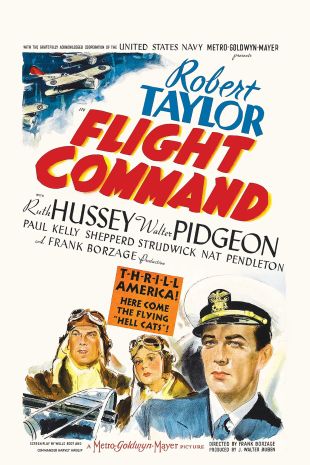Frank Borzage (pronounced "Bor-ZAY-gee") was of Swiss, Italian, and Austrian ancestry, born in Salt Lake City, UT, the fourth of eight children of an Italian-speaking stonemason father and a German-speaking mother. As a boy, he was drawn to acting. At age 20, he'd gone to work for producer/director Thomas Ince. He was supposed to be a general-purpose actor, moving between light leading roles and supporting parts as villains, but in 1914, he achieved stardom in The Wrath of the Gods, a melodrama about an interracial romance between Borzage's character and a woman portrayed by Tsuru Aoki. He starred in several more notable films for Ince, and by 1916, had become an actor/director, beginning with The Pitch O' Chance.
In 1920, Borzage released Humoresque (which was remade in 1946), his first major film as a director, based on a novel by Fannie Hurst. Notable as an extraordinarily vivid drama about Jewish life on the Lower East Side of Manhattan, the film moved Borzage to the front ranks of Hollywood's newest generation of directors. His other important silent titles included the 1923 drama The 'Nth Commandment and Seventh Heaven (1927), for which he earned the very first Academy Award ever given for Best Director. In the bargain, he helped turn Janet Gaynor and Charles Farrell into stars of the first magnitude -- he followed it up a year later with the even better Street Angel, re-teaming Gaynor and Farrell in one of the finest films of the 1920s.
Borzage barely skipped a beat with the coming of sound, doing a 1930 adaptation, Liliom (which had been previously shot in Germany by Fritz Lang), and Bad Girl (1931), for which Borzage earned his second Best Director Oscar and which gave both Sally Eilers and James Dunn two of the best roles of their respective careers. The following year, he directed A Farewell to Arms, one of the most acclaimed and successful screen adaptations of a contemporary novel of the period, starring Helen Hayes (who got a Best Actress nomination) and Gary Cooper, which is also notable from a directorial point of view for the dark, expressionist approach that Borzage took to the segments involving the action of the First World War.
By the mid-'30s, Frank Borzage was regarded as one of Hollywood's finest screen craftsmen, looked to for his sensitive, delicate touch in handling difficult stories -- perhaps the most representative of his films was Three Comrades, about the friendship between three childhood friends and a girl who dies young. He made important movies for several studios during the early to middle part of the decade, doing A Farewell to Arms at Paramount, Secrets (a remake of his own 1924 film) at United Artists (which marked Mary Pickford's screen farewell), and Living on Velvet at Warner Bros., but by the second half of the '30s Borzage had settled at MGM, then the most prestigious studio in Hollywood. Although his work was best known for its sentimentality and emotional nature, Borzage could and did make movies on serious topical subjects of social significance, most notably Little Man, What Now? (1934), starring Margaret Sullavan and Douglass Montgomery, which told of the plight of the ordinary man in post-World War I Germany. He also directed Joan Crawford in three of her most intriguing movies of the period, Mannequin, The Shining Hour (both 1938), and Strange Cargo (1940). In 1940, Borzage also directed The Mortal Storm, an unusual pre-World War II Hollywood attack on the social order of Nazi Germany, depicting the destruction of an innocent family; it is probably the Borzage movie that plays best to modern audiences.
During the first half of the 1940s, Borzage's output became decidedly less interesting. Flight Command (1941) was a routine, albeit very well-cast story of military pilots and their private lives, while The Vanishing Virginian was a gentle, sentimental story of life in a rural, early 20th-century white southern household, and Smilin' Through was a handsome but empty remake of a romantic ghost story that had been filmed twice before, in the 1920s and the 1930s. Stage Door Canteen (1943) was his major contribution to the war effort, and in addition to its careful balance of patriotism and sentimentality, it is essential viewing for 1940s popular culture fanatics, with its enviable mix of entertainment talent. In 1945, Borzage moved to RKO where he showed himself an able satirist with The Spanish Main, a gentle jape at the conventions of the pirate movie. He moved to Republic Pictures in 1946, where studio chief Herbert J. Yates was trying to make a small body of "art"-oriented movies and higher-quality films than his usual outputs of Westerns, serials, B-comedies, and musicals -- the result was I've Always Loved You (1946), a sweet and sentimental melodrama about a pair of musicians (Catherine McLeod, Philip Dorn) torn apart by professional rivalry, and the man's stubbornness; shot in color and featuring pianist Arthur Rubinstein on the soundtrack, it was the single most expensive movie ever released by Republic up to that time. Moonrise (1949) was Borzage's venture into the dark psychological eddies of film noir, and was one of his finest efforts, beautifully directed and filled with visually stunning scenes, though the script's weaknesses kept it from being regarded as a classic. This was to be his final film for a decade -- his lack of theatrical film work during this period has led some critics and scholars to suggest that Borzage was blacklisted, but this is patently untrue. The kind of movies in which he specialized were simply no longer being made -- even the output of his contemporaries King Vidor and John Ford slackened during this period (though Ford always had John Wayne, with his immense box office appeal, available to help get a film up and running).
Borzage did direct three installments of the anthology series Screen Director's Playhouse, but was otherwise unseen again until 1958 when he made China Doll. A World War II drama starring Victor Mature, Li Li Hua, and Ward Bond, it told the tale of a hard-drinking, disillusioned Army Air Force pilot who accidentally buys a wife and gradually falls in love with her; he finds himself with a new reason to enjoy and savor life, and they marry and have a child; both of them are killed by the Japanese, but their daughter survives, the living embodiment of the two of them and the love they shared. China Doll was greeted indifferently by the critics and was on television as early as 1965, but it has since come to be regarded as a superb coda to the main body of Borzage's work. He closed out his career the following year with one of his few misfires, a sincere but leaden attempt at making a religious epic. Adapted from Lloyd C. Douglas' bestseller, The Big Fisherman was shot in Super Panavision and ran more than three hours before being edited down to 164 minutes and then to 149 minutes; it was a financial disaster, though its religious subject matter and availability gave it a second lease on life on television during the late '70s, when it was syndicated nationally (in a heavily cropped and edited form. In 1962,Borzage died of cancer -- by that time, he was considered by many critics to have long outlived his best work, most of which was thought of as celebrated but dated relics of a bygone era. In the decades since, Borzage's reputation has slowly been revived as younger viewers have discovered his best work and accepted it on its own merits.


